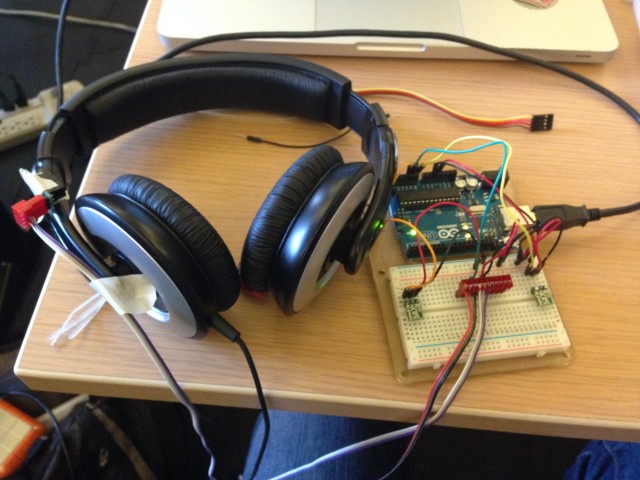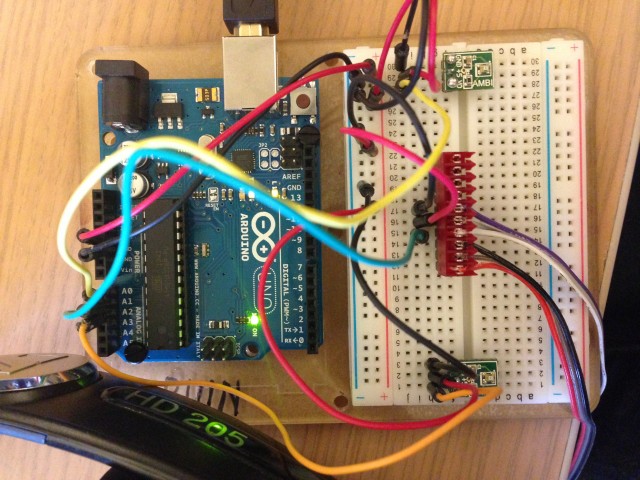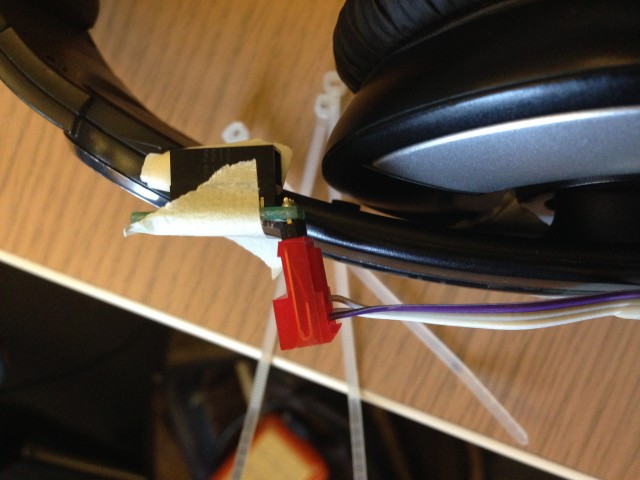Sensors: Thunder
Thunder
I was working on a site fairly recently where a nearby building was using an old siren as a warning. The kind that served as warnings for the Blitzkrieg. This got me thinking about warnings, and I ended up wanting to work with that same sound. Thunder is, in concept, a simulator for someone reminiscing about the blitz. It consists of three sensors: one proximity sensor on the headphones, and 2 light sensors on the board. Triggereing all of them will cause a recording of blitz sirens to play. Removing your hands or taking off the headphones causes the audio to stop.
//video here
In this video, the headphones are unplugged for demonstration reasons. Originally I wanted to have it so that the user’s hands would have to cover their ears, but this led to complications. The act of physically placing your hands in a certain place functions as giving an entry and exit to the space of memory.
the full rig
the two green squares are light sensors, and the purple/white cable set leads to the headphone sensor. the other leads nowhere and does nothing.
Arduino Code. Modified to return a yes/no response
int sv0 = 0; // variable to store the value coming from the sensors
int sv1 = 0;
int sv2 = 0;
int req = 400;
void setup() {
Serial.begin(9600); // initialize serial communications
}
void loop() {
// Read the value from the sensors:
sv0 = analogRead (A0);
sv1 = analogRead (A1);
sv2 = analogRead (A2);
//Serial.print(sv0);
//Serial.print(" : ");
//Serial.print(sv1);
//Serial.print(" : ");
//Serial.println(sv2);
if((sv0 < req) && (sv1 < req) && (sv2 < req)){
Serial.println ("A");
} else {
Serial.println ("B");
}
delay (50); // wait a fraction of a second, to be polite
}
Processing Code
// Processing program to handle audio playing
// Import the Serial library and create a Serial port handler
import processing.serial.*;
Serial myPort;
import ddf.minim.*;
Minim minim;
AudioPlayer player;
int valueA; // Sensor Value A
int valueB; // Sensor Value B
Boolean running = false;
//------------------------------------
void setup() {
size(1024, 200);
// List my available serial ports
int nPorts = Serial.list().length;
for (int i=0; i < nPorts; i++) {
println("Port " + i + ": " + Serial.list()[i]);
}
// Choose which serial port to fetch data from.
// IMPORTANT: This depends on your computer!!!
// Read the list of ports printed by the code above,
// and try choosing the one like /dev/cu.usbmodem1411
// On my laptop, I'm using port #4, but yours may differ.
String portName = Serial.list()[5];
myPort = new Serial(this, portName, 9600);
serialChars = new ArrayList();
minim = new Minim(this);
player = minim.loadFile("AirRaidSirens1.wav");
}
//------------------------------------
void draw() {
// Process the serial data. This acquires freshest values.
processSerial();
background (150);
}
//---------------------------------------------------------------
// The processSerial() function acquires serial data byte-by-byte,
// as it is received, and when it is properly captured, modifies
// the appropriate global variable.
// You won't have to change anything unless you want to add additional sensors.
ArrayList serialChars; // Temporary storage for received serial data
int whichValueToAccum = 0; // Which piece of data am I currently collecting?
boolean bJustBuilt = false; // Did I just finish collecting a datum?
void processSerial() {
while (myPort.available () > 0) {
char aChar = (char) myPort.read();
// checks whether all sensors are currently triggered or not.
if (aChar == 'A' && running == false) {
running = true;
player.play();
println("playing...");
} else if (aChar == 'B' && running == true) {
running = false;
println("stopping");
player.pause();
player.rewind();
}
}
}


